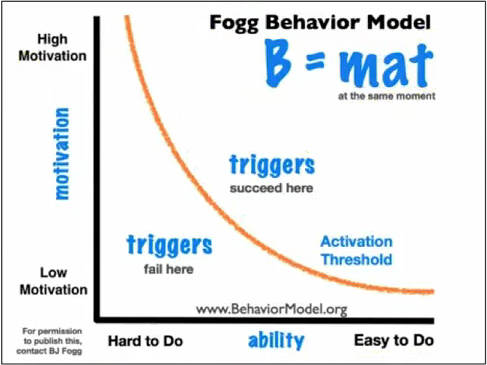1.游戏化的好处(Gamification for Good)
社会公益——帮助人们做对社会有益的事
个人影响——让人们感到快乐
这两点的不同之处:
1.动机不同:有无归属感(需要激发人们,显现这么做的意义)
2.慎重使用奖励(有可能使人们失去内在动机)
3.行为改变(使人们的行为变得更好)
2.社会公益的案例(Social Good Application)
健康保健:
锻炼减肥、病后恢复
能源环境:
节约能源、回收资源
教育学习:
(慎用奖励)开放式证书平台
政府部门:
与公民互动、推动表决议程
3.社会公益的技巧(Social Impact Techniques)
错开行车拥堵高峰系统:
反馈&奖励,监控,社会压力
能源资源节约系统:
在社会公益上运用竞争,效果明显好于商业活动
推广可持续发展系统:
运用影响——列出具体数字(你的影响),激励人们做节约行为
重用社交——利用人们喜欢社交,喜爱分享,激发人们做节约行为
不提供实物奖励——使用虚拟积分,不可兑换货币,只用来提高用户等级、权限、权力等,这有助于提高用户发布信息的真实性
不超速彩票奖励系统:
运用几率——人们喜欢惊喜感
4.行为改变(Behavior Change)
习惯的培养:
使人们将有意识的行为变为无意识的行为。
B=MAT(Behaviors 行为 Motivation 动机 Ability 能力 Trigger 触发因素)
在橘黄线右上的行为是人们愿意做的。
选择适当的时间触发期望的行为尤为重要
触发因素(Trigger)的三种类别:
1.火花(Spark):提高动机
2.引导(Facilitator):提高感知力(告诉人们这中行为很容易)
3.信号(Sign):给予信号,人们就会自发的行动(动机和能力都很高)
游戏回环:
参与回环(Engagement Loop):通过反馈不断地增强动机
进程回环(Progression Loop):新手引导、阶段、关卡,告诉人们这关不难,增强感知力























 811
811

 被折叠的 条评论
为什么被折叠?
被折叠的 条评论
为什么被折叠?








